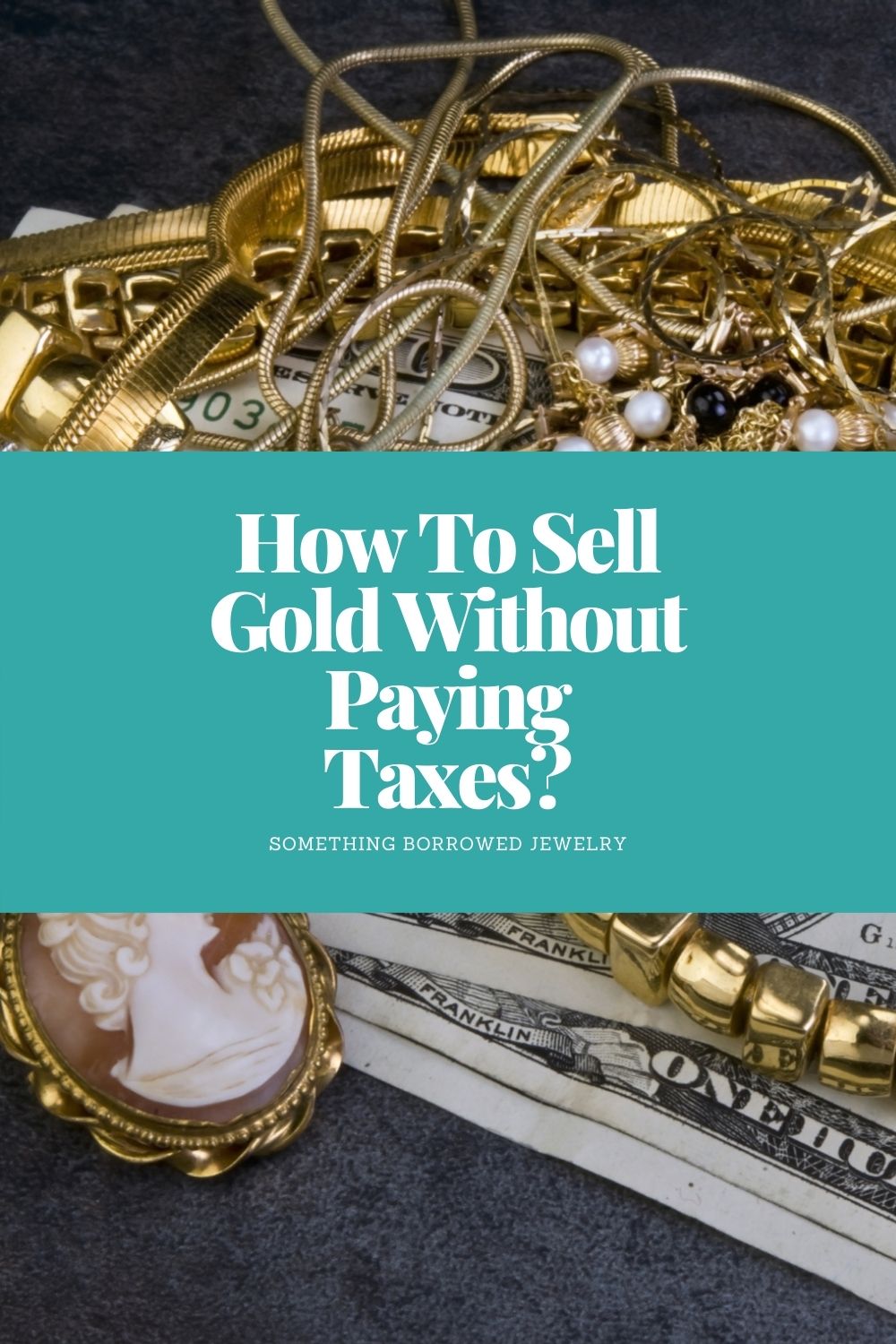
Everyone is looking for a way to do business without the government’s intervention. Don’t get it wrong, the government does a tremendous job with our taxes, but nobody wants it to go overboard and overcharge you for the profits. Certainly, finding out how to sell gold without paying taxes is would save you a basketful of bucks!
How can you buy and sell gold without paying taxes? You can trade an unlimited amount of gold and not pay the tax when using the self-directed Roth retirement account. Or, you can postpone the gold taxes with the 1031 IRS exchange.
The Internal Revenue Service (IRS) requires you to report any physical gold sales on Form 1099-B. IRS believes that the sale of gold is part of income, and you must therefore submit the form and indicate the type of metal you are selling.
In this post, we’ll show you how to sell gold without paying a dime in tax.
Taxing Gold
According to the IRS, gold is a collectible, just like art, antiques, and other precious metals. The taxman will apply taxation rules on gold coins, bars, and ingots based on their value and not the purity of gold metal content.
So, the IRS taxes the actual total price of the gold item, including its artistic or rarity value.
What Influences the Tax Levied on Gold Sales?
Various authorities have specific guidelines on the tax levied on the sale of gold. World over, people buy and sell gold in the form of coins and jewelry.
The tax rates for gold depends on:
- The form of gold
- How long you hold the gold
- Your trading account
- Your jurisdiction and state laws
- Gold investment strategy
How the form of gold influences your tax payments
Are you selling sovereign gold bonds, digital gold, jewelry, collectibles, or gold motor funds? When making your declarations in the Capital Gains and Losses Schedule D of the IRS, the type of metal you sell will determine which part you fill.
And, indeed, it will influence the amount of money you pay less tax for selling gold.
See some forms in which you can sell gold.
-
Digital Gold
Sometimes you don’t want to handle the actual physical gold. Instead, use a digital gold currency that represents masses of gold units.
-
Gold funds
If your investment fund holds gold, then it’s a gold fund. Some gold funds hold physical bullion while others hold ventures, futures contracts, and shares from gold mining companies. Most gold fund investors aim at hedging inflation risks.
-
Bonds
The value of coins and bills keeps depreciating with time. You’d have bought more items with $100 bills 20 years ago than you would do today. Instead of storing your money in the bank in the form of currency, you can decide to use grams of gold. So, the dollars would be multiple 1 grams of gold. The sovereign gold bond investments are less riskier than ordinary money.
-
Physical Gold and Bullion
Bullion is gold and silver that hits 99.5% purity. In most cases, bullion is in the form of ingots and bars instead of coins and ornaments. Gold, on the other hand, can take any form and does not involve silver.
-
Coins
Gold coins contain 22-carat gold and symbolize wealth or good luck.
-
Jewelry
Gold ornaments are the most popular forms of the shiny yellow metal. However, most jewelry can’t contain pure gold because it’s too soft, so it has rolled gold or alloys.
Is it a short or long-term investment?
How long have you held the gold? The IRS will use your answer to judge how much tax to levy on your gold.
The IRS considers gold sales as part of capital assets under the collectibles category. Therefore, as long as you hold rare coinage, ingots, bullion bars, and coins you, will be subject to Capital Gain Tax(CGT).
However, the CGTs only apply if you have held the gold for more than a year.
Is Gold Exempted in the Capital Gain Tax in Your Country?
First, understand the gold taxation laws in your country. Does your country consider bullion as part of its legal currency? Does your government enforce laws that exercise capital gain taxes on your collectibles?
In British law, gold sovereigns and Gold Britannia coins are Capital Gains Tax-free because they are considered British legal currency. Therefore, any profit you get from your investments, regardless of the value or quantity, is free!
Also, the gold sales tax in the United States depends on state laws. The IRS is responsible for the 1099 B reports, but specific states have the power to levy certain taxes on businesses and individual.
The taxes and costs can add up and overwhelm you unless you are doing business in a state that doesn’t have strict gold tax laws.
If you are a seller and you take a loss during your gold trading endeavors, you will not pay tax for that. In fact, you can write off losses amounting to $3,000 a year.
Who are you, and which account are you using to sell your gold?
Are you selling or buying gold, and you think your current IRS account slows you down? Are you a retiree or an heir?
If you’re a retiree, you can get a self-directed account and trade without worrying about taxation.
But, such an account would require you to prove you are a retiree in the first place. Then, you will put in place a strategy to legally escape the taxes levied on your gold sales.
Reporting Gold Sales to IRS
What’s the total amount of gold you can buy without notifying the IRS? How do you report your gold sales to the IRS?
If you’re trying to get profits from the sale of gold in America, you have to tell the tax authority about your income. So, you or your dealer must fill your income in Form 1099-B to the IRS. The form declares that you are not a company or corporate gold seller.
Remember, the tax liabilities levied on precious metals don’t happen immediately. Instead, it’s on your tax return form 1040 Schedule-D that you will declare the profits you gain from selling physical gold.
The IRS demands that you file returns for the sale of 25 or more ounces of gold, including Maple Leaf Gold, Mexican Onza coins, and the gold Krugerrand.
If you sell gold bars equal to a kilogram or 100 Oz, the tax authority requires you to report that as well. However, you don’t have to fill or report the Gold Eagle Coins sales in Form 1099-B. The tax billing happens at the same time as your income tax.
Tax Implications of Selling Your Gold
Several micro investors prefer silver and gold in their physical form instead of the exchange-traded funds (ETF). First, however, it’s worth understanding the implications of trading physical bullion.
Here, we help you understand the taxation implications of selling gold.
The methods that the IRS taxes precious metals are different from stocks, ETFs, and mutual funds. When you have physical gold, you will be subject to a marginal tax rate of about 28%.
People in the 33% or the 35% and 39.6% bracket will only have to pay 28% of the profits they get from selling gold.
If you have any short-term gains on the sale of precious metals, then your tax will be per your standard income rates.
Selling Gold Without Paying Taxes
The IRS is always looking for its fair share of the gold profits you make. However, you have the chance to twist and check whether your profits are income or capital gains.
Selling and buying investment gold comes with short or long-term gain taxes. In case you are a regular buyer and seller, you fall under the retail dealer category. The IRS treats your earnings as income tax.
But, if you are a hobbyist collector, you have a 28% tax rate.
But, with the self-directed Roth retirement account, the IRS will not enforce taxation on any amount of gold you sell!
1. Selling Tax-Free Gold With Self-Directed Roth Retirement Accounts
Many people believe that IRS and 401k plans are only for bonds and stocks. But the US has no legal penalty for using your retirement account to sell gold.
But you have to make sure you don’t touch the physical gold. Put it on hold in a self-directed IRA account, the simple account, the SEP-IRA account, or the 401K account.
The value of assets in the Roth account grows without any taxation. Therefore, of all your assets in the Roth account, only the real estate taxes will apply.
So, open a self-directed Roth account by instructing an administrator to hold gold on your behalf. Then, anytime you want to sell gold, you will direct the administrator with the price and amount and buyers’ details.
The administrator will initiate the transaction for you. However, if you are trading physical gold, you will need a third party to hold it for you.
Just like that, you will be selling gold without paying taxes!
Will IRS Prohibit my transactions if I sell gold with self-directed accounts?
You have to be careful how are you operate the self-directed account. For instance, you can’t lend money to yourself, your relatives, or dependants.
Also, the gold in IRA has to be pure, including Maple Leaf Gold, Mexican Onza coins but notr South African Krugerrands. The IRS can prohibit your transactions if they realize you are trying to circumvent this.
In addition to the prohibitions, they might even disband your account and charge cumulative taxes, among other severe penalties.
2. Postponing Gold Taxes
In most cases, you’re not going to avoid paying tax forever, but you can postpone it. If you use the 1031 IRS exchange, it can be reinvested, and you won’t pay a dime at a time. So, you can reinvest all the proceeds of selling gold into more gold.
The IRS does not levy any taxes on such transactions. It’s only until you cash in the gold that you will have to pay tax.








